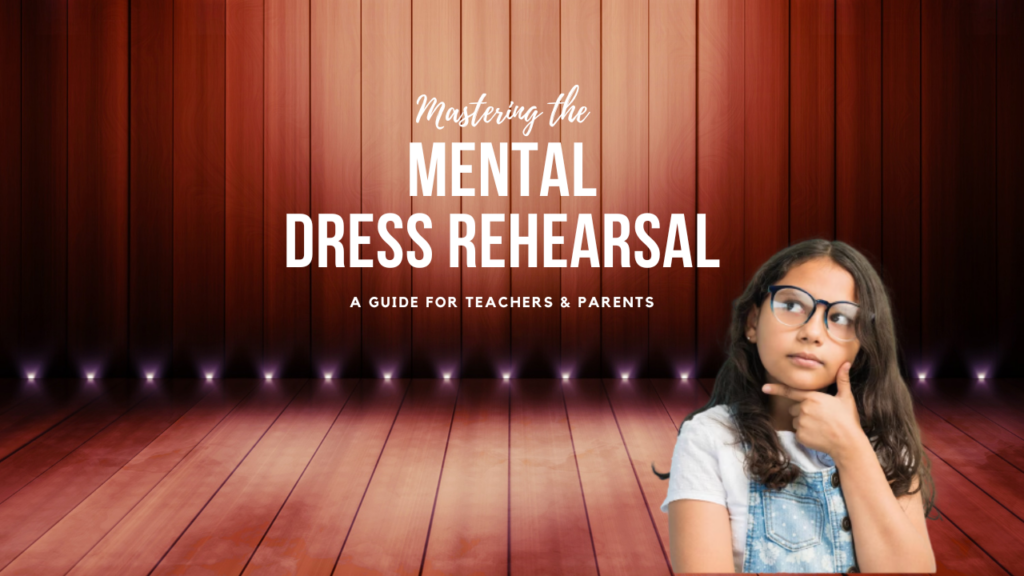As the sun begins to set, you find yourself sitting behind the wheel of your car, ready to embark on a flurry of evening activities. As you navigate the familiar route home, your mind springs into action, engaging in a mental dress rehearsal of the tasks that lie ahead. You mentally choreograph the evening’s agenda—picking up the children from daycare, shuttling them to practice or dance class, preparing a quick dinner for your hungry family, and even remembering to stop by the store to pick up a gallon of milk. This intricate mental dance you perform is a perfect example of mental dress rehearsal, a powerful technique that allows you to plan and execute tasks effectively.
Let’s explore the concept of a mental dress rehearsal, its benefits in fostering executive functioning, and practical strategies for teaching children this invaluable skill.
The Power of Mental Dress Rehearsals
For most adults, mental dress rehearsals often take place during the quiet moments spent in transit, such as driving home from work. As you mentally rehearse the forthcoming tasks, your mind paints a vivid picture of what needs to be accomplished. From picking up the children to making a quick dinner, every step is meticulously planned. This intuitive use of mental dress rehearsal exemplifies its effectiveness in organizing and strategizing.
Teaching Mental Dress Rehearsals to Children
To empower children with strong executive functioning skills, teaching them how to conduct mental dress rehearsals is essential. By walking children through mental rehearsals, parents and teachers provide them with a powerful tool for effective planning and task initiation. Here are practical strategies for teaching a mental dress rehearsal to children:
- Reflect on Everyday Scenarios: Encourage children to share their thoughts on everyday activities, such as getting ready for school or participating in extracurricular activities. Have them imagine themselves in the setting where the task will take place. Prompt them to think through the sequence of events and potential challenges they might encounter as they visualize themselves moving through the process, toward accomplishing the goal.
- Practice Mental Dress Rehearsal Sessions: Set aside dedicated time with your child to engage in mental dress rehearsal sessions. Together, choose a scenario or task, such as preparing a snack or packing a school bag, and guide them through mentally visualizing the steps involved. Encourage discussion and problem-solving as they explore different approaches.
- Encourage Independent Mental Dress Rehearsals: As children become more comfortable, encourage them to practice independently. Prompt them to mentally rehearse tasks before beginning them, helping them develop self-directed planning skills.
- Extend Mental Dress Rehearsals to Group Activities: Encourage children to apply mental dress rehearsals in group activities, such as planning and organizing games or group projects. This fosters collaboration, effective communication, and shared responsibility, enhancing their executive functioning skills.
Benefits of Mental Dress Rehearsals for Children
By incorporating mental dress rehearsals into their lives, children experience numerous benefits that enhance their executive functioning skills. Mental dress rehearsals enable children to:
- Develop Effective Planning Skills: By visualizing the steps involved in a task, children can anticipate what needs to be done, break it down into manageable components, and create a roadmap for success. This ability to plan ahead lays a solid foundation for efficient task execution.
- Enhance Problem-Solving Skills: As children mentally rehearse a task, they can identify potential challenges or obstacles that may arise. By envisioning different scenarios and exploring possible solutions, children become adept at adapting their plans and developing strategies to overcome difficulties. This adaptive problem-solving fosters resilience and resourcefulness.
- Improve Task Initiation: Many children struggle with initiating tasks, often feeling overwhelmed or uncertain about where to begin. Mental dress rehearsals provide a clear framework, enabling children to approach tasks with confidence. By mentally rehearsing the steps involved, children can alleviate the anxiety associated with task initiation and proceed with a sense of purpose.
- Cultivate Time Management: By considering the time required for each step of a task, children learn to allocate their time effectively. They become mindful of deadlines and develop the ability to prioritize tasks based on their importance and urgency. This skill becomes increasingly valuable as children navigate school projects, extracurricular activities, and other responsibilities.
The Role of Parents and Teachers
As parents and teachers, we play a crucial role in fostering children’s executive functioning skills through mental dress rehearsals. By modeling the process ourselves, we provide children with a tangible example of how to engage in this practice. We can also facilitate joint mental dress rehearsals, guiding children through the steps of various tasks and encouraging open discussion. Through these collaborative experiences, children gain a deeper understanding of the process and its applications.
It is essential to encourage children to embrace independent mental dress rehearsal. Encourage them to take a moment before starting a task to mentally visualize the steps they need to take. This practice can be applied to various activities, from completing homework assignments to preparing for a sports competition. With consistent practice, mental dress rehearsal becomes a natural and ingrained part of their problem-solving and planning repertoire.
So to sum it all up, the mental dress rehearsal is a powerful cognitive strategy that empowers children with effective planning, problem-solving, and task initiation skills. By incorporating this technique into their lives, parents and teachers set children on a path to success, helping them navigate the demands of daily life with confidence and resilience. So, let us embrace the little life lesson of a mental dress rehearsal and equip our children with the big life skills they need to thrive in school and beyond.
Watch a Lesson on YouTube
Links to Books & Activities on this Topic:
What Should Danny Do?
An innovative, interactive book that empowers kids with the understanding that their choices will shape their days, and ultimately their lives. Written in a “Choose Your Own Story” style, the book follows Danny, a Superhero-in-Training, through his day as he encounters choices that kids face on a daily basis.
What Should Danny Do? School Day
Readers get to decide how Danny’s day at school will end! Children love being able to make all the choices for this Superhero-in-Training and control the outcome of the book, while parents and teachers love the lessons the book teaches!
What Should Danny Do? On Vacation
Danny learns even more about his Power to Choose while on Vacation! Filled with pertinent lessons dealing with personal responsibility, empathy, kindness, sharing, and so much more!
What Should Darla Do?
From the creators of What Should Danny Do? Readers will relate to the spunky, young Darla as she navigates through relatable scenarios that so many kids face on a daily basis.

